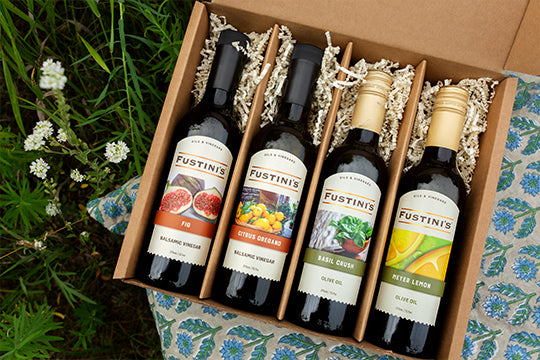The Making of Olive Oil
Lining the supermarket shelves in the baking aisle, you’ll find things like canola oil, peanut oil, and vegetable oil. With so many options, you may wonder, “what’s the difference?” Yet what’s often missing from grocery store shelves is a level of the highest quality olive oil, extra virgin olive oil.
Here at Fustini’s Oils & Vinegars, we’re pretty passionate about the difference extra virgin olive oil can make for both your health and tastebuds! But what makes this oil so special? It’s all about where it comes from and how it’s made.
Here, we’ll share about the origins of this oil like no other, different types, and why the title of ‘extra virgin’ olive oil is so important.
Roots of Olive Oil
Olive oil has long been associated closely with Mediterranean cuisine. In fact, historians focus on the Middle East area as the origin of olive oil. This shouldn’t be a surprise as we think of what foods and ingredients are most often associated with olive oil. Olive oil became an interest in surrounding areas over the centuries and different processes arose to get the quality oil out.
In ancient times, it was called “liquid gold”, as it was used for much more than cooking. It was also used in perfumes, soaps, and much more–including for both health and cosmetics. With its numerous health benefits, we’re not surprised!
Today, many countries around the world produce extra virgin olive oil. Fustini’s partners with producers either in the northern or southern hemisphere, depending on the time of year.
How Is Olive Oil Made?
Olive oil is made through a process called extraction. This thorough process includes harvesting and crushing the olives into a paste. It is then put into a centrifuge to separate the oil from the rest of the oil residue. The oil is then again filtered and is ready to share! Throughout the process of creating extra virgin olive oil, no chemicals or heat are used.
What Does “Extra Virgin” Olive Oil Mean?
The description of “extra virgin” with olive oil is a key distinguisher when it comes to the quality and integrity of the olives used in the pressing of oil. “Extra virgin” can also be known as “cold press” or “first press.”
Simply put, extra virgin olive oil is oil that is extracted during the very first pressing of olives from the harvest. This ensures that there are no defects, meaning there’s no over-exposure to the sun, sitting in the ground too long, bugs, and that they are properly handled during the harvesting, milling, decanting process.
What makes Fustini’s extra virgin olive oil different from the kind you find in clear bottles on store shelves? Fustini’s works closely with suppliers to create relationships that ensure we offer the highest quality and freshest olive oil. In fact, the bottles of “extra virgin olive oil” you find on grocery store shelves usually are NOT 100% extra virgin olive oil as they lack flavor and health benefits.
Other Types of Olive Oil
While extra virgin olive oil has the highest quality, there are other types of olive oil in the process as well.
Virgin Olive Oil
This unrefined process is similar to that of extra virgin olive oil as it is the first press, but the process uses heat or chemicals to extract the oil. It therefore does not retain as much of the quality as extra virgin olive oil.
Refined Olive Oil
Virgin or light olive oil is created when the leftover olive paste from the first press is heated and kneaded again with additional chemicals to be able to extract more oil. These chemicals are needed to improve the flavor.
This type of oil does not have the same level of quality or flavor as extra virgin olive oil. It’s used as a way for the “old harvest” olive oils to still be able to be sold to customers who are not familiar with what high-quality olive oil should be.
Know the Difference in Oils
Extra virgin olive oil has its quality reputation for a reason. With maximum health benefits and flavor, this oil is above the rest. At Fustini’s, you can explore both SELECT extra virgin olive oils and flavor-infused oils for all your cooking and meal prep.






